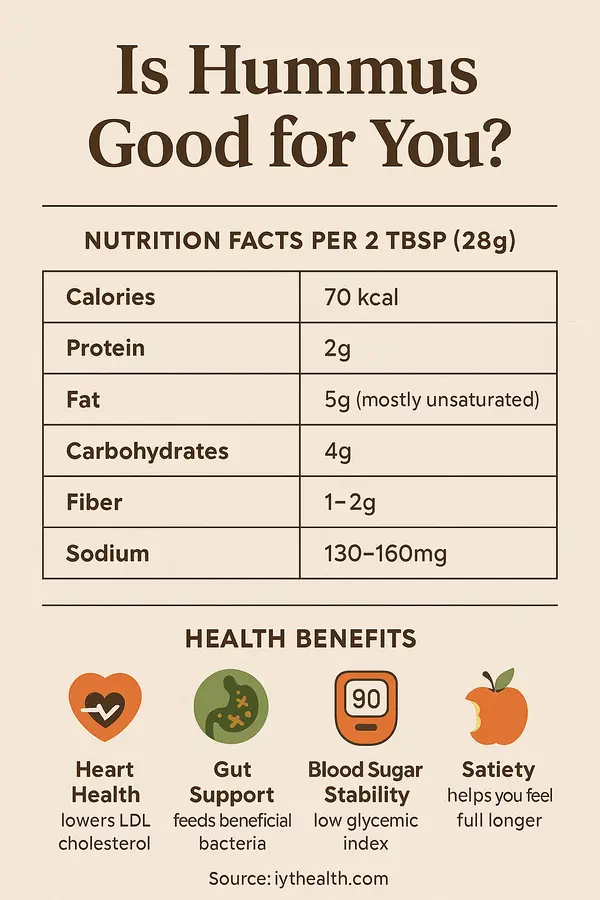Imagine a food that’s ancient enough to be mentioned in 13th-century cookbooks, yet cool enough to dominate modern snack aisles at Whole Foods. That’s hummus — a velvety blend of cooked and mashed chickpeas (a.k.a. garbanzo beans), tahini (ground sesame paste), olive oil, fresh lemon juice, and garlic. Originating from the Middle East, this creamy concoction has evolved from a regional delicacy into a global fridge essential.
Ranking of Health Benefits People Associate with Hummus (Survey 2024)
| Health Benefit | % of Respondents |
|---|---|
| High in Protein | 82% |
| Heart-Healthy Fats | 76% |
| Rich in Fiber | 65% |
| Low Glycemic Index | 43% |
| Gut Health | 38% |
This chart illustrates the top health benefits people associate with hummus based on a 2024 survey. Protein content and heart-healthy fats are the most recognized attributes, while gut health and glycemic impact are less commonly noted.
Hummus isn’t just a food — for many, it’s a lifestyle. It’s the MVP at parties (move over ranch dip), a lunchbox regular, and the quiet hero in many vegetarian and flexitarian diets. Whether scooped with carrots in California or smeared onto warm pita in Michigan, hummus adapts effortlessly. It’s savory, satisfying, and deceptively simple — like the culinary equivalent of a well-written tweet: compact, but packed with meaning.
In the U.S., hummus has become a go-to snack for the health-conscious and flavor-seeking alike. It’s commonly used as a dip, a spread, a salad enhancer, or even a pasta sauce substitute. Basically, if avocado toast had a cousin with Middle Eastern roots and a nutty edge — it’d be hummus. But is this dip just trendy, or is it truly good for your health?
Nutritional Breakdown: What’s Inside a Spoonful?
Here’s what you’re dipping into when you scoop up 2 tablespoons (about 28 grams) of hummus:
| Nutrient | Amount (per 2 tbsp) |
|---|---|
| Calories | ~70 kcal |
| Protein | 2 grams |
| Fat | 5 grams (mostly unsaturated) |
| Carbohydrates | 4 grams |
| Fiber | 1–2 grams |
| Sodium | 130–160 mg |
Not too shabby, right? Hummus is relatively low in calories, offers plant-based protein, and delivers a good dose of healthy fats and fiber (USDA FoodData Central).
Calories per Serving (2 Tbsp) of Hummus and Other Popular Dips
| Dip | Calories (per 2 Tbsp) |
|---|---|
| Hummus | 70 kcal |
| Ranch Dip | 145 kcal |
| Guacamole | 60 kcal |
| French Onion Dip | 100 kcal |
This chart displays the calorie content per 2-tablespoon serving of popular dips. Ranch Dip ranks highest in calories, while Guacamole offers a lighter option. Hummus and French Onion Dip fall in the mid-range, providing a balance between flavor and caloric content.
How Does It Compare to Other Common Foods?
To give you a better sense of what these numbers mean in everyday terms, here’s a comparison with other common snacks and staples:
| Food Item | Calories | Protein | Fat | Fiber | Sodium |
|---|---|---|---|---|---|
| 1 boiled egg (50g) | ~77 kcal | 6g | 5g | 0g | 62 mg |
| 1 medium banana (120g) | ~105 kcal | 1.3g | 0.3g | 3.1g | 1 mg |
| 1 slice whole-wheat bread | ~70 kcal | 3g | 1g | 2g | 130 mg |
| 2 tbsp peanut butter | ~190 kcal | 7g | 16g | 2g | 150 mg |
| 1 string cheese (28g) | ~80 kcal | 6g | 6g | 0g | 200 mg |
As you can see, hummus is lighter than peanut butter and cheese in both calories and fat, yet offers more fiber than most protein snacks. Compared to bread or bananas, it brings in healthy fats and a touch of plant-based protein. It’s a well-rounded option — kind of like the Swiss Army knife of snacks: not excessive in any one area, but helpful in several.
Major Health Benefits of Hummus
1. Heart Health Hero
Thanks to its olive oil and tahini content, hummus is rich in monounsaturated and polyunsaturated fats, which help reduce bad cholesterol (LDL) and support cardiovascular health. A 2020 meta-analysis in the Journal of Nutrition found that higher legume intake is associated with a 10% lower risk of heart disease (source).
Think of it this way: Just like high-octane fuel helps an engine run cleaner and smoother, these healthy fats help your heart perform more efficiently and reduce wear and tear over time.
2. Gut-Friendly Fiber
Chickpeas are a great source of soluble fiber, which feeds good gut bacteria. This helps with digestion and may even support mental health. One small 2023 clinical trial showed that daily hummus intake increased Bifidobacteria levels in participants by 15% after four weeks (Clinical Nutrition ESPEN).
Analogy time: Picture your gut as a garden — fiber acts like rich compost that helps beneficial plants (aka good bacteria) grow, pushing out the weeds (harmful bacteria).
3. Blood Sugar Stability
With its low glycemic index (GI), hummus causes a gradual rise in blood sugar levels (Harvard Health Publishing). That makes it a smarter snack option for people with prediabetes or type 2 diabetes.
Here’s a comparison: It’s like switching from a roller coaster to a gentle elevator — hummus helps your blood sugar rise smoothly, not spike and crash.
4. Weight Management
Thanks to the combo of fiber, protein, and healthy fats, hummus can help keep you full longer. One observational study from UCLA involving 1,207 adults found that those who regularly ate hummus had smaller waistlines — about 2 inches (5 cm) less, on average — than those who didn’t (study summary at NCBI).
To put it simply: Imagine your stomach like a gas tank — hummus fills it up slowly and steadily, so you don’t feel the urge to refuel with junk an hour later.

Are There Any Downsides?
Sure, nothing’s perfect — not even hummus.
1. Sodium Content
Store-bought hummus can be high in sodium, which adds up quickly if you’re not careful. Some brands contain up to 200 mg per 2-tbsp serving. Making it at home? You control the salt.
2. Hidden Additives
Commercial brands may include preservatives or added oils. Always check the ingredient list. Pro tip: If you can’t pronounce it, you probably don’t want to eat it.
3. Allergies
Hummus contains sesame (via tahini), a common allergen in the U.S. — officially added to the FDA’s list of major allergens in 2023.
Satiety Index of Hummus vs. Other Snacks (Perceived Fullness Score)
| Snack | Satiety Score (1–10) |
|---|---|
| Hummus & Veggies | 8.2 |
| Chips | 4.5 |
| Crackers | 5.0 |
| Cookies | 3.8 |
| Cheese Cubes | 7.0 |
This chart presents perceived satiety scores for various snack options. Hummus with vegetables leads in fullness, followed by cheese cubes. Traditional snacks like chips, crackers, and cookies show lower satiety levels, making them less effective at curbing hunger.
Hummus in Real Life: U.S. Medical Case Snapshots
- Female, 35, Brooklyn, NY: A freelance graphic designer juggling multiple deadlines added hummus to her afternoon snack routine — pairing it with baby carrots and cucumber slices. Within three weeks, she noticed fewer sugar cravings during work hours and felt less bloated by evening. “It’s like my stomach finally got the memo on how to chill,” she joked.
- Male, 52, Phoenix, AZ: Recently diagnosed with prediabetes, this HVAC technician swapped out his usual bag of chips for hummus and celery sticks. Over two months, his fasting blood sugar dropped from 108 to 95 mg/dL. His wife, a nurse, said he’s also been in a better mood and “not constantly raiding the pantry after dinner.”
- Female, 28, Chicago, IL: A marketing assistant with a sensitive gut began incorporating hummus into her plant-focused diet. After daily use for one month, she reported more regular digestion and less bloating, especially post-lunch. She now recommends it to friends looking for “real food that doesn’t fight back.”
- Male, 44, Atlanta, GA: A busy dad of three, he started bringing hummus snack packs to work instead of energy bars. He found they kept him fuller longer and reduced his mid-afternoon energy crashes. “I used to zone out around 3 p.m. Now I just dip and keep going.”
- Female, 61, Seattle, WA: Living with mild hypertension, she began watching her sodium intake more closely. After switching from ranch dip to homemade low-salt hummus, she noticed her blood pressure readings consistently improved over six weeks — from 138/88 to 124/80 mmHg. Her doctor was pleasantly surprised.
Diagnostic Tools: Can Hummus Fit Into Your Health Plan?
Want to know if hummus is a good fit for your diet? Here are some diagnostic angles:
| Diagnostic Tool | How It’s Done | Accuracy (1–10) | Avg. Cost (USD) |
|---|---|---|---|
| Food Sensitivity Test | Blood test or hair sample analysis | 5–7 | $150–$300 |
| Lipid Panel | Blood draw, checks cholesterol | 9 | $25–$50 |
| Continuous Glucose Monitor (CGM) | Real-time blood sugar tracking via sensor | 9.5 | $100–$300/month |
| Nutrigenomics Testing | DNA swab to assess food metabolism | 8 | $200–$500 |
Recommended Products and Innovations
Sabra Classic Hummus
One of the most widely available hummus brands in the U.S., Sabra Classic is known for its creamy consistency and classic flavor. It’s gluten-free and comes in convenient packaging for on-the-go snacking. However, it does contain around 150–200 mg of sodium per 2-tbsp serving, so portion control is key. Sabra products are sold in most major supermarkets and usually priced around $3–$4 per 10-ounce (283-gram) container.
Advantages:
- Easy to find nationwide
- Consistent quality
- Wide variety of flavors
Hope Foods Organic Hummus
This Colorado-based brand uses cold-pressed, high-pressure processing (HPP) instead of heat pasteurization, which helps retain flavor and nutrients without chemical preservatives. Hope hummus is USDA-certified organic, non-GMO, and contains only a handful of clean, pronounceable ingredients.
Advantages:
- No artificial preservatives
- Organic and non-GMO certified
- Strong customer reviews on freshness and taste
Price range: Around $4.50–$5.99 for an 8-ounce (227-gram) container. Must be kept refrigerated and consumed within 7–10 days after opening.
Homemade Hummus Kits (e.g., from Etsy Sellers)
These kits offer a DIY experience with pre-measured dry ingredients like dried chickpeas, tahini powder, spices, and instructions — just add water, blend, and optionally refrigerate. Ideal for people who want full control over sodium levels and flavor.
Advantages:
- Customizable
- Long shelf life (unlike ready-made hummus)
- Often more economical in the long term
Typical cost: $10–$15 per kit, yielding 3–5 servings. Some kits include organic or heirloom ingredients for added nutritional value.
NutriSense CGM Program
While not a hummus brand, NutriSense offers a wearable continuous glucose monitor (CGM) that shows exactly how your body reacts to different foods, including hummus. This innovation is especially useful for people with insulin resistance, prediabetes, or those tracking weight loss goals.
Advantages:
- Personalized insights
- App-based tracking with expert support
- Helps build a hummus-friendly diet based on real-time glucose responses
Monthly plans start at $225 and include sensors and data analytics. Especially valuable for individuals seeking precision nutrition strategies.
Editorial Advice
Reyus Mammadli, medical consultant, recommends hummus as a “nutrient-dense snack that supports metabolic health and gut balance — especially when paired with whole vegetables.”
Pro Tips:
- Choose hummus with fewer than 150 mg of sodium per serving
- Pair with sliced cucumber, carrots, or bell pepper instead of chips
- Refrigerate homemade hummus and consume within 3–5 days
- Try adding roasted red pepper or beetroot for extra antioxidants
So yes, hummus is more than a trendy dip — it’s a legit health ally. Just watch the sodium, skip sketchy ingredients, and scoop smart.
About the Author
Reyus Mammadli is the author of this health blog since 2008. With a background in medical and biotechnical devices, he has over 15 years of experience working with medical literature and expert guidelines from WHO, CDC, Mayo Clinic, and others. His goal is to present clear, accurate health information for everyday readers — not as a substitute for medical advice.







